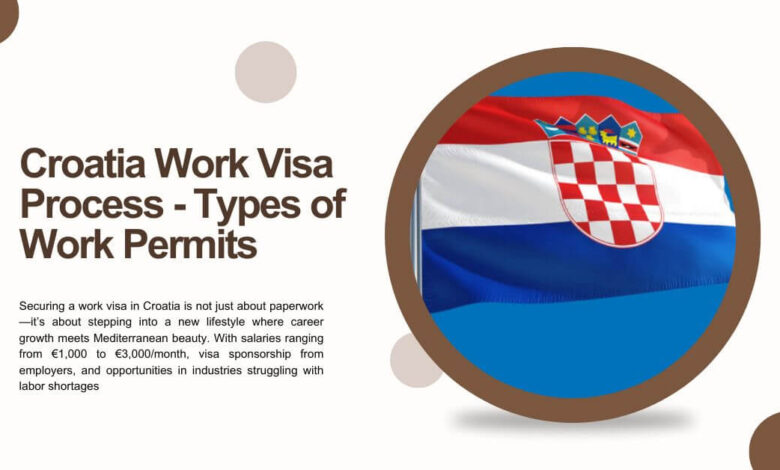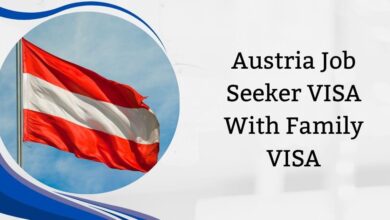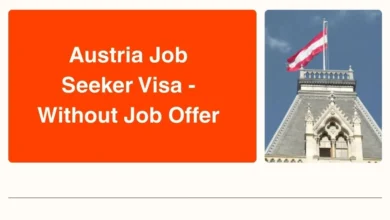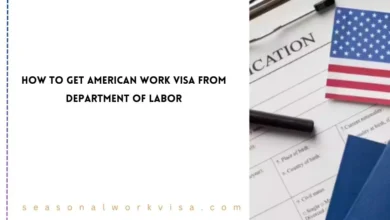Croatia Work Visa Process 2026 – Types of Work Permits

One of the most beautiful places in Europe is Croatia. Croatia switched to the euro as its currency. Croatia only has 3.9 million people living there. A lot of businesses and people want to work in Croatia. It has a list of jobs that are in high demand, which can make it easier to get a work permit. Here, we’ll talk about how to get a work visa for Croatia, the different kinds of work permits, and the things you need to do to apply for a work visa.
People from other countries who want to live and work in Croatia can get a work visa. Not if you are from the European Union (EU) or the European Economic Area (EEA). You can work in Croatia without a work visa. But if you’re not from the EU or EEA, you’ll usually need both a work permit and a living permit. Anyone coming to Croatia for more than 90 days as a worker will also need to apply for a Croatia long-stay (type D) visa.
Why Work in Croatia?
Croatia offers a unique blend of professional opportunity and an enviable lifestyle that is increasingly attractive to expats.
- Thriving Economy & EU Membership: As a member of the European Union, Croatia offers stability, access to the wider European market, and a currency now aligned with the Eurozone (it adopted the Euro in 2023).
- High Quality of Life: Enjoy a fantastic work-life balance, surrounded by incredible natural beauty, rich history, and a vibrant café culture.
- Addressing Labour Shortages: With many young Croatians seeking opportunities elsewhere, the government has streamlined processes to attract over 160,000 foreign workers, issuing more than 43,000 permits in a single two-month period alone.
- Pathway to Europe: A work permit in Croatia is a foothold in the EU, offering travel freedom and long-term opportunities.
Types of Croatia Work Permits for Foreign Workers:
- Regular Work Permit & Residence Permit: This is the most popular type of work permit. It is good for one year and can be extended two times.
- EU Blue Card: This residence card is for highly qualified workers and is good for two years. If certain conditions are met, the person may be able to stay permanently.
Benefits of Working in Croatia
- Legal Right to Live and Work in a beautiful EU country.
- Access to Schengen Area for travel with a residence permit.
- High Quality of Life with stunning nature, rich culture, and delicious food.
- Growing Economy with opportunities in key sectors.
- Supportive Expat Community and welcoming locals.
Requirements to get a work permit:
- You need to have a job in Croatia before you can get a work permit. It means you need to have a real job offer.
- The company that hired you will go to the Croatian Ministry of Labour and ask for a work pass on your behalf.
- If you already have a work permit, you can go to the Croatian embassy or consulate in your home country to get a visa. You can look at this list of Croatian consulates and offices to find one near you.
- The process is different in each country. Calling the office to ask about the Visa process is always the best thing to do.
- Once you get to Croatia, you’ll need to go to the local police office and ask for a residence permit. This is your short-term residence card.
Fields that are In-Demand:
There is a list of in-demand jobs in Croatia that can make it easier to get a work permit.
Since these jobs can change, you should check with the Croatian Employment Service (https://www.hzz.hr/en/) for the most up-to-date information.
These are some fields that are often in demand:
- Information and Communication Technology (ICT)
- Engineering
- Tourism & Hospitality
- Healthcare
Why You Should Work in Croatia?
Croatia needs foreign workers to fill in some gaps in their workforce because they don’t have enough local workers. People want to work in the tourist and construction industries.
Croatia used to have a quota system that limited the number of foreign workers who could come to work there. People from other countries can get work passes more easily now. However, companies still try to hire locals first.
How to Apply for the Croatia Work Visa?
After getting a job and getting a work permit. The last thing you need to do is apply for a Croatia Long Stay Visa. This visa is good for a year.
You will need to take the visa application form, the work pass, and all the other paperwork to the Croatian Embassy in your country. You can look at this list of Croatian consulates and offices to find one near you.
After getting your visa, you can go to Croatia, get your residence pass, and start working.
Helpful Resources:
Here are some helpful resources:
Websites to Find Jobs in Croatia:
In-Demand Professions in Croatia Due to Labor Shortages:
According to CEDEFOP, there is a lack of workers because many young Croatians are leaving the country for better opportunities. There is also a high demand for skilled and experienced professionals in the following areas:
- Construction: Building workers, electricians, plumbers.
- Tourism: Hospitality management and services.
- Automotive: Mechanics, auto body workers.
- Technology: Programmers, system administrators.
- Other Skilled Trades: Carpenters, chefs, bakers, and butchers.
Conclusion
Securing a work visa for Croatia is a structured process made easier by the country’s acute need for your skills. It is an opportunity to trade the ordinary for the extraordinary to build a meaningful career while enjoying a Mediterranean lifestyle that is the envy of Europe. By understanding the requirements, targeting in-demand sectors, and partnering with a willing employer, you can turn your dream of living in Croatia into a rewarding reality. Your adventure on the Adriatic coast awaits.
Frequently Asked Questions:
How can I obtain a work visa in Croatia?
Croatia has a work permit system, not a work visa. A qualifying employer must first offer you a job to qualify for one. That employer must do a labor market test to prove to the Croatian government that no one in Croatia could fill the position.
How much is the Croatian work visa fee?
The embassy charges €74.32 for issuing the employment visa for Croatia. – €31.85 for a biometric residence permit. – €9.29 for administration costs.
How long does it take to get a work visa in Croatia?
The passport should be at least valid for three months after the expiry of the work permit document. The Croatian company should issue the work permit letter no more than 60 days after the date of submission in VFS. Processing can take up to 20 working days after receiving the application.




